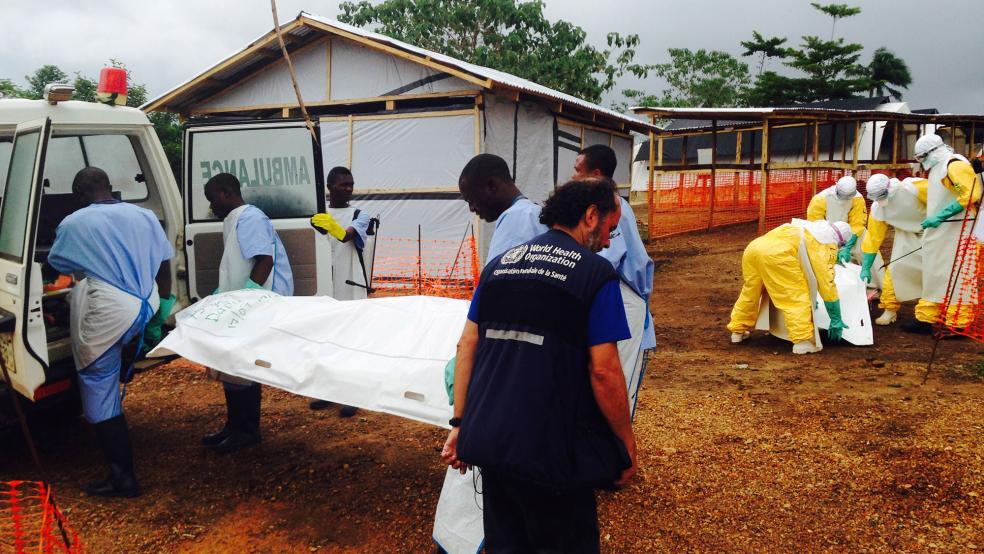The United States and the rest of the international community is ramping up its response to the deadly Ebola virus that has killed thousands in Africa and is slowly spreading to other countries around the world.
On Tuesday, officials confirmed that a Spanish nurse became the first person to contract Ebola outside of Africa—sparking even greater concern among world leaders.
Related: How to Protect Yourself from Ebola
The nurse likely became infected with the lethal virus after treating patients who had contracted Ebola in West Africa—they later died in Spain. Now at least three other potential Ebola patients are being monitored there, according to the Spanish government.
Meanwhile, the United States confirmed its first official diagnosed case of Ebola in Dallas last week, and separately, an NBC journalist is being treated for Ebola in Nebraska after contracting the disease on assignment in Liberia.
Now, the Obama administration is bolstering its efforts to combat a potential outbreak in the United States. On Monday, President Obama announced that airports will soon begin screening travelers who come from certain West African countries where there’s been an outbreak of Ebola.
Employees from the Centers for Disease and Control will be posted at four major airports, JFK in New York, Newark in New Jersey, Chicago and Washington Dulles. They will question travelers about where they have been, as well as look for symptoms, NBC News reported.
Related: The U.S. is Trying to Stop an Ebola Pandemic
Still, lawmakers on Capitol Hill say those precautions don’t go far enough. On Tuesday, Rep. Frank Wolf (R-VA) and Sen. Jerry Moran (R-KA) urged the president to appoint a senior advisor to coordinate federal agencies' responses to any Ebola outbreak.
Meanwhile, Rep. Tim Murphy (R-PA) said the Obama administration should tighten up travel restrictions to Ebola-stricken countries in West Africa.
The United Kingdom said it does not plan to implement any kind of Ebola screening process system. The country has already seen several incoming patients who contracted the disease in Africa and traveled to seek treatment.
One British nurse survived after he was treated at the Royal Free Hospital in London, The Express UK reported. Since then, UK officials have expressed confidence in their efforts to deal with imported diseases.
Still, others are warning that potential for an outbreak is very real.
Related: Can Ebola’s Experimental Drugs Be Fast Tracked?
Just last week, scientists warned that Ebola could reach British shores by October 24, Reuters reported. Using a predictive model based on air traffic to infected regions, the same scientists said there is an even greater chance the virus will be imported to France during that same time period, since there are many people traveling to and from France from many of the infected countries including Guinea, Sierra Leone and Liberia.
Last month, the World Health Organization declared Ebola a “public health emergency of international concern,” calling for a “coordinated international response.”
Ebola has already killed at least 3,400 people in West Africa, with more than 7,400 suspected, probable and confirmed cases, according to WHO.
Related: 11 Ways to Fight Ebola and Other Diseases
So far, the United States has sent 350 troops and 130 other U.S. workers to West Africa to aid victims and to quell the outbreak. Obama said as many as 4,000 troops could eventually be dispatched to the region. Meanwhile, other countries and international aid groups are sending resources to the region.
Even China is sending aid and a medical team to Africa—marking the first time China has ever offered to help foreign nationals undergoing a public health emergency, CCTV reported. China has invested billions of dollars into this region and has a huge financial incentive to be involved in the effort to quell the deadly Ebola outbreak.
According to AidData, China poured $22 billion in Guinea and around $3 billion each in Sierra Leone and Liberia, between 2000 and 2011. During that same time period, China invested about $47 billion into Nigeria, which experts warn could be the next country at risk for a major outbreak, The Diplomat noted.
Chinese scientists have reportedly identified an Ebola antibody that could ultimately aid in the development of a vaccine, which as of right now, does not exist. Meanwhile, scientists at the U.S. National Institutes of Health are in the process of testing a potential vaccine.
Top Reads from The Fiscal Times:





